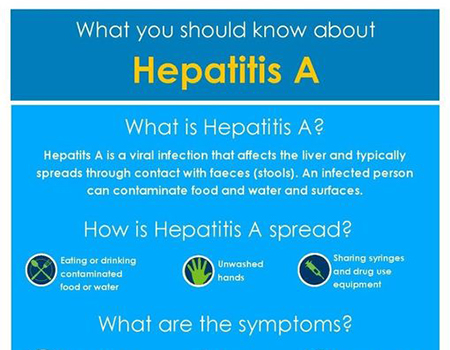Hepatitis is the second major killer infectious disease after tuberculosis, and nine times more people are infected with hepatitis than HIV.
Hepatitis is preventable, treatable, and in the case of hepatitis C, curable. However, over 80% of people living with hepatitis are lacking prevention, testing and treatment services.
It’s important for you to be aware of hepatitis and to learn how you can protect yourself and your family from being infected.
Transmission of this virus can be prevented through better awareness and services that improve vaccinations, safer injections and blood transfusions, and to reduce long-term damage and harm.
What’s hepatitis?
Hepatitis is an inflammation of the liver, most commonly caused by a viral infection. Each type of hepatitis is caused by a different virus.
The 5 main hepatitis viruses are:
Hepatitis A – spread mainly through eating food or drinking water that’s been contaminated by the faeces of an infected person. It can also be spread by eating raw shellfish that have come from water contaminated by sewage.
Hepatitis B – transmitted through contact with the blood or other body fluids like saliva, semen and vaginal fluid of an infected person. It can be passed on from mother to child during childbirth.
Hepatitis C – spread through blood-to-blood contact. In rare cases it can be transmitted through unsafe sex and during childbirth.
Hepatitis D – spread through contact with infected blood through unsafe injections or transfusions.
Hepatitis E is mainly transmitted through eating food or drinking water that’s been contaminated by the faeces of an infected person. It can also be spread by eating raw shellfish that have come from water contaminated by sewage.
All these viruses cause short-term, or acute infection. However, hepatitis B, C and D viruses can also cause long-term infection, called chronic hepatitis, which can lead to life-threatening complications such as liver failure and liver cancer.
When you experience the following symptoms, it could be viral hepatitis and can be confirmed by a blood test.
These symptoms include:
- fever,
- tiredness,
- abdominal pain,
- nausea and vomiting,
- darkening of urine,
- loss of appetite, and
- jaundice (yellow colouring of the skin and white of the eyes).
If you experience any of these potentially serious symptoms you need to see a doctor immediately
- persistent vomiting for longer than 6 hours,
- extreme drowsiness, confusion or restlessness,
- unusual bruising or bleeding, and
- if jaundice continues for longer than 3 weeks



